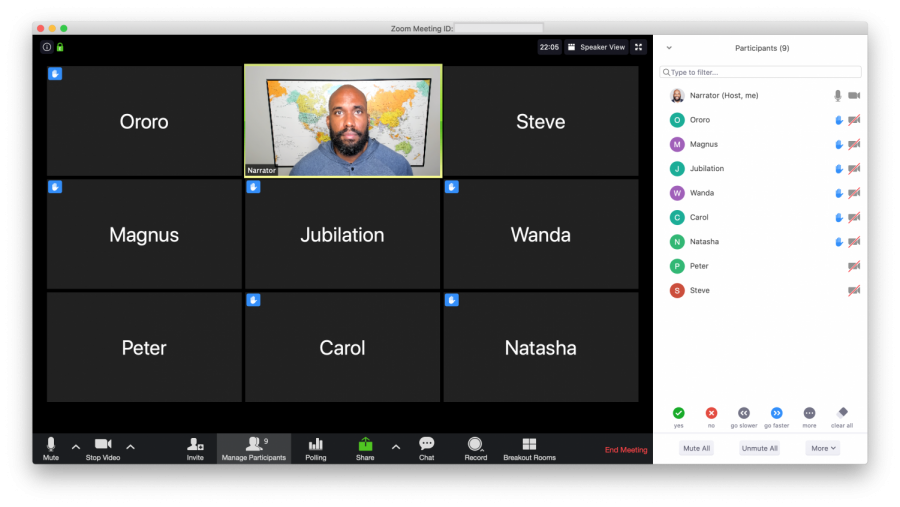We have begun to circumvent our initial concerns that included overwhelming homework and accidentally missing classes (from the students’ point of view) and correctly structuring a course (from the perspective of the teachers), among other things. I, myself, have become more organized and prepared for class.
So, while the school year continues its upward ascent, we have started to settle into the comfortable position of actually knowing what’s going on. However, amid the tumultuous tempest that we called the first few months of school and the calm sea we have started to find ourselves upon, there have been significant problems that most people have overlooked.
While the rest of us have gotten used to seeing ourselves on camera, others, who make up more of the student population than we think, have found themselves unable to learn under the current “rules” of online education. Such injunctions include, but are not limited to, keeping your camera on during class.
While it may be hard for some to understand why this subject is of such great consequence, I implore those same people to ask themselves what importance students’ mental health is to their learning and how some could be negligent to the problems those students face. Mental health is pertinent to a student’s education and when students complain of anxiety at the hands of online learning rules, it is obvious they are not achieving the intended level of their education. And, while online learning has slightly melted away into the restricted in-person classes, it still remains in certain circumstances. The impact of it also remains in the minds of students.
I have had the pleasure of communicating with a Punahou Academy student about the topic of cameras. That student made it very clear that the strain of “having a camera pointed at [his] face for hours” is awkward, to say the least.
I know more students like him, two of which are my sisters, who feel that of the problems they encounter during online school, the plight of having to show your face on camera for the whole school day is by far the most formidable. I’ve witnessed my sister take hour-long naps after school because she explained to me that it is her only way of escaping from her anxiety that stems from online education.
I recognize a significant percentage of the student population has grown indifferent to their cameras being on, myself being part of this lot. However, the people affected by the mental strain of online learning find it difficult to learn from or even understand their teachers. So, on their behalf, while I can not directly speak for them, I ask those who don’t understand to think about a time you’ve been afraid. Maybe as a child of the looming monster under your bed, or just a couple of days ago when you realized you forgot to turn in an assignment.
While fear plays a big part in the cocktail of emotions that acts as a chaser to anxiety, many students I’ve talked to describe the feeling of their privacy being violated. I realize there may be more significant problems looming around us, or other concerns that draw a veil on the difficulties the Punahou Academy students face. I ask you to recognize (and by you, I mean teachers, administrators, and all people in an authoritative position) that while Punahou has grown to be so much more, we are still, at our core, a school. How can we operate as a school in which some of the students can’t or find it hard to learn?
In this issue, I hope to bring to light the problems we as a community face. An easy solution would be to listen to the students who have a great deal to say and who feel they can’t express it. It is not impossible; teachers I have been taught by have recognized a dilemma in the structure of our online school. Even if our teachers realize how vital giving their students choice in this matter, I can imagine (and have been told) that they still want to see our faces, if not for the importance of keeping us in check, then just to interact with us and get to know us.
With this, I can understand and sympathize. I believe that the job of a teacher is much harder than that of a student, especially as of right now. It must be tedious and frustrating to have to rewire an entire curriculum to adapt to the global circumstances. And, from a psychological standpoint, it would get lonely to teach to a class of blank screens.
I completely agree with teachers’ points on why our cameras should stay on. This is why this topic is central to a debate: there’s no easy answer. However, if the teachers have the privilege of having the final say in this argument, weighing our mental states against the possibility of seeing our ‘smiling faces’ (and, yes, I realize this is not the only reason for keeping our cameras on), we need to rethink our definition of community.
The next step in the aforementioned possible solution would be to restructure the rules of online school to cater to more than one group of people. I realize this is easier said than done. I cannot think of a way through this problem where everyone comes close to winning. I simply ask the teachers to try.
Yes, sometimes, you may bump up against some students who will abuse your rules to escape listening to your lessons or something similar. However, I believe the best way to learn to trust someone is to trust them. That is what I hope will become of our Punahou community. Trust us, we are learning to advocate for ourselves.

